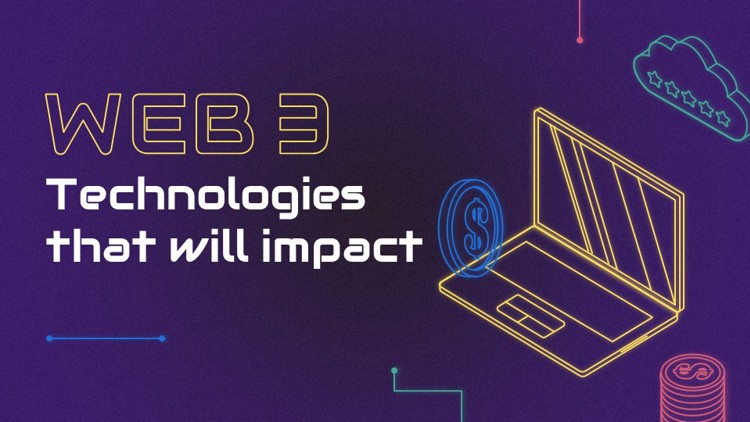12-Dec-2023
Lets Immerse into the world of WEB 3.0


Web 3.0 represents a vision for the future of the internet that goes beyond the current web's limitations, aiming to provide a more user-friendly, open, and decentralized digital environment. The transition to Web 3.0 involves ongoing technological advancements and changes in the way we conceptualize and interact with online information.
Some key features of Web 3.0:
Decentralization: Web 3.0 aims to reduce reliance on central authorities and intermediaries. Blockchain technology is often seen as a key enabler, providing decentralized and transparent systems.
Interoperability: Improved compatibility and seamless data exchange between different applications and platforms, allowing for more fluid and integrated user experiences.
Semantic Web: Web 3.0 is expected to better understand the context and meaning of information, enabling more intelligent searches and interactions.
User Empowerment: Users have greater control over their data and digital identity. They can decide how, when, and where their information is shared across the web.
Smart Contracts: Self-executing contracts with the terms of the agreement directly written into code. These are often powered by blockchain technology, ensuring transparency and automation.
Machine Learning and AI Integration: Enhanced use of artificial intelligence and machine learning to provide more personalized and predictive online experiences.
Enhanced Security: Improved security measures, often supported by blockchain encryption and decentralized authentication, making the web more resistant to cyber threats.
Tokenization: The use of digital tokens, often on blockchain platforms, to represent ownership or access rights. This can apply to various assets, including digital and physical.

In the era of Web 1.0, spanning the late 1990s to the early 2005s, the web was characterized by static HTML pages, limited interactivity, and a predominantly one-way flow of information. Users played passive roles, primarily consuming content on centralized platforms with minimal opportunities for interaction or multimedia engagement.
Web 2.0, emerging in the early 2005s and continuing into the mid-2015s, ushered in the Social Web. This phase marked a significant shift as users became active contributors, participating in social media platforms, forums, and collaborative tools. The emphasis on user-generated content, collaboration, and the rise of rich multimedia transformed the web into a dynamic and interactive space. Mobile responsiveness became a priority, accommodating the surge in mobile device usage.
Web 3.0, the ongoing evolution since the mid-2015s, envisions a Decentralized Web. Anticipated characteristics include a move away from central authorities, leveraging blockchain for decentralized systems, and enhanced semantic understanding through AI and machine learning. Users are expected to gain greater control over their data and digital identities, fostering a more personalized and secure online experience. Interoperability, smart contracts, and heightened security measures constitute key elements, collectively shaping a more intelligent, decentralized, and user-centric web landscape. Web 3.0 signifies a transformative shift, redefining how we interact with digital information and services.
Web 3.0 is poised to harness a suite of groundbreaking technologies that collectively propel the digital landscape into a new era of innovation and connectivity. Among these transformative forces are:
Artificial Intelligence and Machine Learning (AI/ML): These technologies empower the web with the ability to understand, learn, and adapt, facilitating more intelligent interactions and personalized user experiences. AI/ML algorithms enhance data analysis, providing insights that fuel smarter decision-making.
Blockchain: At the core of Web 3.0, blockchain technology introduces decentralization, transparency, and security. It revolutionizes how data is stored and transactions are conducted, fostering trust in a trustless environment. Smart contracts, powered by blockchain, automate processes with unprecedented reliability.
Non-Fungible Tokens (NFTs): NFTs bring digital ownership and uniqueness to the forefront, revolutionizing how we perceive and trade digital assets. From art and music to virtual real estate, NFTs enable verifiable ownership and authenticity in the digital realm, fostering new opportunities for creators.
Cryptocurrency: Cryptocurrencies are the financial backbone of Web 3.0, facilitating secure and borderless transactions. Beyond traditional currencies, cryptocurrencies underpin decentralized finance (DeFi) and drive economic activities within the decentralized ecosystem.
Augmented Reality/Virtual Reality (AR/VR): Web 3.0 enriches user experiences with immersive technologies like AR/VR. From interactive virtual environments to augmented real-world interactions, AR/VR redefine how we engage with digital content, creating more engaging and dynamic online spaces.
Naapbooks Limited stands poised to be a pivotal force in Web3 development, utilizing our expertise to propel businesses into the decentralized future.
Blockchain Integration: Naapbooks can assist businesses in integrating blockchain technology into their systems, enabling decentralized and transparent transactions. This could involve incorporating blockchain for secure record-keeping, smart contracts, and tokenization.
Decentralized Applications (DApps): The company can contribute to the development of decentralized applications (DApps) that operate on blockchain networks. These applications can provide users with enhanced security, privacy, and control over their data.
Smart Contract Development: Naapbooks can offer smart contract development services, creating self-executing contracts that automate and ensure the integrity of various business processes. Smart contracts are a fundamental component of many Web3 applications.
Tokenization Solutions: Leveraging its technological capabilities, Naapbooks can aid in the tokenization of assets. This involves representing ownership or access rights using digital tokens on blockchain networks, which can have applications in various industries.
Security Audits: Naapbooks can conduct security audits on Web3 projects, ensuring that smart contracts and decentralized applications are robust and free from vulnerabilities. Security is a critical aspect of Web3 development.
